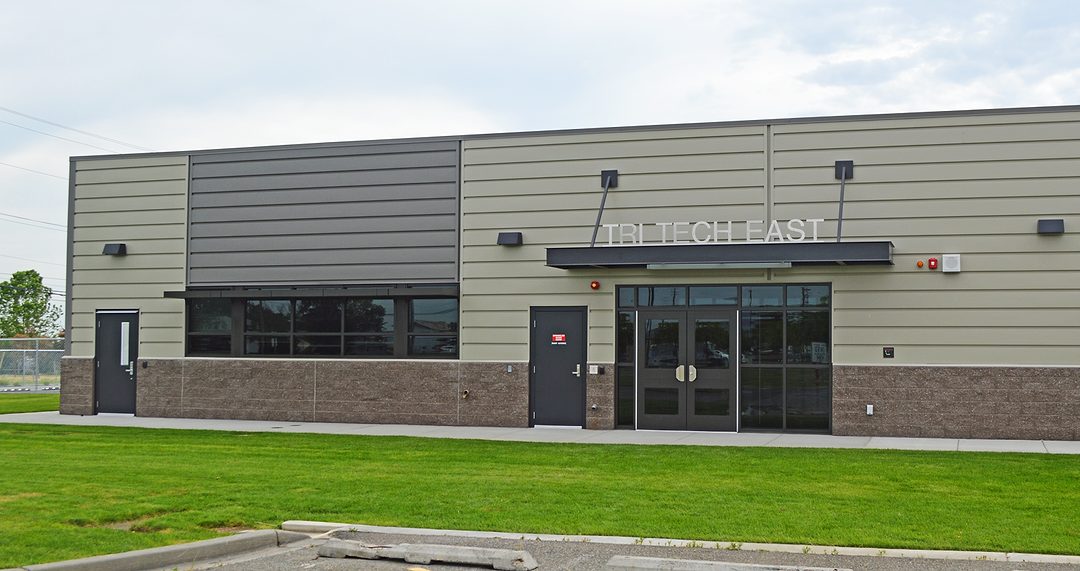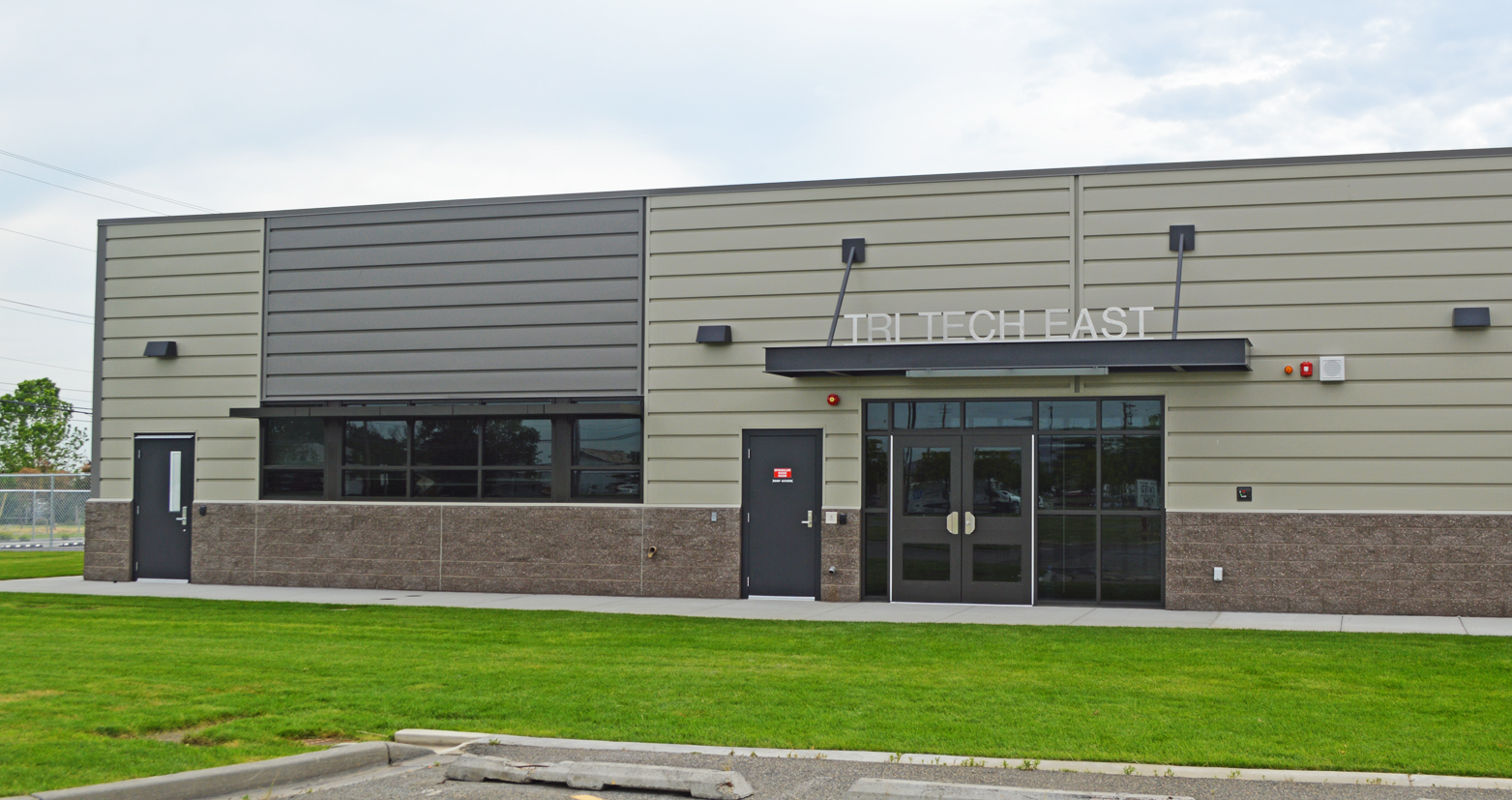
Home » Tri-Tech to offer high school training for in-demand drone careers
Tri-Tech to offer high school training for in-demand drone careers

June 14, 2018
Tri-Tech Skills Center officials hope a new program that includes drone-making will show students the sky’s the limit when it comes to job opportunities and careers in the unmanned flight and manufacturing industry.
The new program launches this fall in a building recently constructed on the school’s Tri-Tech East campus in Kennewick. The building also will be used for existing firefighting and law enforcement programs offered at the tuition-free public school which provides students advanced technical and professional training.
Tri-Tech Principal Paul Randall said the school had been looking for ways to interest students in its manufacturing program, as there are a wealth of jobs available to students with these skills.
“We have tried for years to sell a standard manufacturing-type program. We know that there’s a really good job opportunity, that there’s a really good wage, and the third part of our little test, is ‘Are kids interested?’ We know the first two are there, there’s opportunity and a living wage, but the kids aren’t there,” he said.
Randall discovered a way to get the kids interested during a national career and technical education conference: pair manufacturing classes with drone aviation.
“We’re using something that’s very attractive to kids to hook them, and then build those skills, knowing they’re not going to be entry-level manufacturing workers, but at least they’re interested,” Randall said.
The new program already has enrolled 21 incoming juniors and seniors and can accommodate up to 48 students in a single semester. Having the class at capacity would allow Tri-Tech to hire a full-time instructor rather than a part-timer, which can be more challenging to recruit. Students will receive instruction on designing, manufacturing and assembling a drone, including some with the use of 3-D printing.
Additionally, students will be educated in the Core+ manufacturing curriculum. Core+ is a coding language that can be useful in many careers. In what Randall describes as “a happy accident,” the school learned through its advisory board that the students also would develop experience with PID (proportional, integral, derivative) programming to set up the drone, which can be a highly marketable skill in other industries.
“The programming language is what they use in food processing, and any type of automation,” Randall said. “So our kids are getting introduced to that, which could alone get them a job, and we didn’t even know that at the outset.”
The drone manufacturing and aviation program also will use the software ExploreNet, which is used by Boeing.
The program’s goal is to get students in the air faster to keep their interest.
“We want to start with a very successful experience for the students so we will be using drone kits that are easily assembled, that fit right into ExploreNet,” Randall said. “We could have gotten really complicated with circuit boards, but we didn’t want to do that. This way, they’ll be flying earlier rather than later.”
Students will create the actual airframes for their drone as part of the manufacturing component of the program.
Following their training, Tri-Tech drone manufacturing and aviation students will have the option to seek licensing as a pilot for small unmanned aircraft, known as a Part 107 license, with the Federal Aviation Administration. This allows pilots to get paid for operating a drone, rather than simply for use as a hobbyist. Students also will have the option of being certified in S/P2 industrial safety.
The demand is high for drone operators. There are jobs in disaster management, agriculture, telecommuncications, wildfire mapping and law enforcement. Randall said some of the top needs in the Tri-Cities include the use of drones to monitor high-tension power lines or inspect wind turbines. He said some of the routine inspections of local bridges could eventually be done with drones. This would include autonomous drones, which do not need a person to direct the equipment’s movement through remote control, but rather to supervise it after programming. This is the kind of drone use Amazon envisions to deliver packages to doorsteps one day.
Statistics on employment opportunities for drone operators are not widely available since the industry and demand is so new. But Tri-Tech used a report from the Association for Unmanned Vehicle Systems International, or AUVSI, to make its pitch to the state Office of the Superintendent of Public Instruction, OSPI, for supporting the startup program. AUVSI reports Washington ranks second in the nation after California for jobs and revenue related to drones, with an estimated 10,000 new jobs expected to be created in the state by 2025.
The annual salary range for drone-related jobs is $35,000 to $100,000, according to a report compiled by Tri-Tech.
 A new building on the campus of the Kennewick Tri-Tech Skills Center will house the school’s new drone manufacturing and aviation program, as well as the existing firefighting and law enforcement programs.
A new building on the campus of the Kennewick Tri-Tech Skills Center will house the school’s new drone manufacturing and aviation program, as well as the existing firefighting and law enforcement programs.Tri-Tech’s new building where the program will be based recently was completed at the Kennewick campus on Metaline Avenue, just east of the main building. It includes remodeled portions, as well as new construction.
The $4 million facility is 11,600 square feet and was completed by Banlin Construction of Kennewick. It is on an acre of land that has a field and gravel lot the drone students will be able to use for practice.
Tri-Tech relies on state funding with a local match, and is not part of individual school district bond measures. Randall credited Washington state Sen. Sharon Brown, R-Kennewick, who represents the 8th Legislative District, for helping resolve red tape that held up the project after it was first pursued in 2011. Work finally began in November 2017 and the building was completed in mid-May.
Tri-Tech East is just the start of additional projects planned for the school, which operates as a co-operative for seven local districts, including Kennewick, Richland, Pasco, Finley, Columbia, Kiona-Benton City and North Franklin. Tri-Tech is considered a branch campus of all area high schools within those seven districts, offering programs that might not be available at a typical high school because of costs or lack of interest.
Tri-Tech plans to send its next project out for bid in January 2019 with a targeted completion date of fall 2020. It is looking to expand from the front of the building, with 16,000 additional square feet for a culinary arts facility, exhibit space, revamped lobby and a new program area. Tri-Tech received a $10.8 million grant to complete the next overhaul and expansion.
It’s possible the new program area could be filled by a pre-physical therapy program that’s also launching in August 2018 and backfilling the space in the main building that once held the law enforcement and firefighting programs.
The new pre-physical therapy program already has enough students enrolled to run two full sessions, and the administration is recruiting for an instructor.
“People are paying attention. The school districts are supporting a shift from the ‘college-for-all’ as the only definition of success as a four-year baccalaureate degree,” Randall said. “We need post-secondary training, there’s no question about that. But the employment reality is that most jobs are in what we do. The big change in demand is for jobs that don’t require a four-year degree.”
The drone manufacturing and aviation program launches in August. Randall expects it to take up to five years to grow every new program, but is encouraged by the early interest and believes the school has answered the question on how to improve that pipeline of students pursuing a craft with one that’s also in high demand.
Local News Manufacturing
KEYWORDS june 2018




